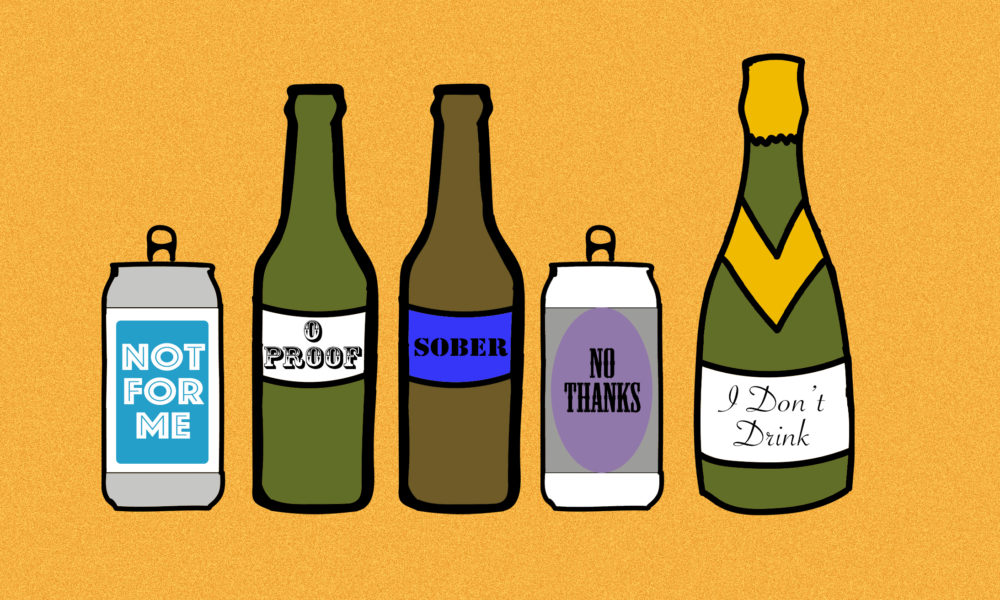Alcohol is poison. At least that’s what Keir Bildgen, a second-year mechanical engineering major, thinks.
“It’s not something I want to put in my body, just in general,” she said. “There’s really no benefit for me to drink.”
Bildgen,19, is part of a minority of young adults who don’t drink alcohol. In recent years the idea of living life without alcohol, or with less alcohol, has gained momentum.
In 2018, 55.1% of adults ages 18 to 25 reported being current alcohol users, according to the National Survey on Drug Use and Health. That percentage is lower than in previous years from 2002 to 2017. The percentage of young adults who binge drink also dropped from 39% in 2015 to 34.9% in 2018.
Bildgen said she avoids alcohol mainly for health reasons, and she doesn’t think she’ll change her mind about it as she gets older.
“I feel strongly about it for myself,” Bildgen said. “In terms of other people, I would never tell other people what to do. I don’t think it’s morally wrong, but I personally don’t like the idea of doing something that alters my mental state.”
It’s no secret that alcohol can have serious negative effects on the human body, but its use is still prevalent among college students. In 2017 the NSDUH study showed that 53.6% of full-time college students ages 18 to 22 drank alcohol in the past month compared to 49.9% of others the same age.
Niloofar Bavarian, an assistant professor in the Department of Health Science, said the impact of alcohol use in the college population is well documented.
Bavarian cited a National Institute on Alcohol Abuse and Alcoholism study that showed over 1,800 student deaths were alcohol-related, including vehicle crashes.
“In addition to mortality, alcohol is associated with morbidity in the college population. Alcohol-related violence is also well-documented in the college population,” Bavarian said in an email.
The same study found that each year 696,000 students ages 18 to 24 are assaulted by another student who has been drinking, and 97,000 students in the same age group reported experiencing alcohol-related sexual assault or date rape.

Roughly 20% of college students meet the criteria for Alcohol Use Disorder, and 25% reported academic consequences from drinking.
Ryan Lowe, a fourth-year accounting major, said the first time he consumed alcohol was when he was about 5 years old. He grabbed a cup of what he mistakenly thought was apple juice from a table at a park where older people were hanging out. He said he hasn’t had another drink since.
“Alcohol is something that is a can of worms that I’d rather just not open at all,” Lowe said. “Both in terms of I’d rather not have any, and I’d also rather not put myself in situations where I become intoxicated. Just because, obviously, it puts you in a place where you’re vulnerable.”
Lowe, 20, said his age is another motivator for not drinking.
“I know I’m below the legal drinking age, and that it’s just unwise, in my opinion, to engage in it,” he said. “I have a lot that kind of tells me, ‘Hey, you shouldn’t do this, even if everyone else is.’”
According to Lowe, the media’s portrayal of alcohol normalizes its consumption, which then desensitizes people from the risks involved in drinking. His own friends and coworkers have joked about getting him “wasted” for his 21st birthday, but he said that won’t happen.
“For some people, it’s such a big thing that they do regularly,” he said. “I think that it’s kind of concerning, at least for those people, where that is the thing they do when they aren’t working or when they aren’t at school. Or, maybe it’s the immediate thing they jump to when they want to socialize.”
Angela Fortado, a third-year criminal justice major, isn’t one of those people who drinks alcohol regularly. She said she’s had about five drinks since she turned 21 years old. She’s now 25.
“I consider myself the sober friend,” Fortado said. “I don’t really intend on drinking when going out, depending on where we’re going, I prefer to be aware and observant of surroundings.”
Fortado wasn’t sure her experience with alcohol would fall under sober or “sober curious,” a term that has been adopted by some people who drink but choose to drink less, whether that choice is permanent or temporary. It doesn’t apply to those who suffer from alcoholism.
Fortado shared that one side of her family has had numerous issues with alcohol and drug use, and her mother is severely allergic to alcohol. These factors have contributed to her general avoidance of alcohol.
Despite her friends sometimes encouraging her to drink and making suggestions of fruity drinks they think she might like, she considers herself sober by personal choice.
“A glass of something here and there, alright, but I don’t think I would ever be the type of person who actively goes out and drinks, or opens a bottle at home and just relaxes, drinking while watching a movie or something,” Fortado said.
But perhaps the biggest contributor of her choice to be mostly sober, she said, is the death of her older sister who was killed in a car accident in 2002 after the driver of the car she was in decided to drunkenly race along a cliff.
Out of the six people in the car, Fortado’s sister was the only one who passed away. She was 18 at the time. She was also the only one with no alcohol in her system.
“My thoughts, with this in mind, [are] that I would never want to allow myself to get into a position like that, where one wrong choice to drink could be so detrimental to someone else,” she said. “It’s a deep paranoia that I don’t think I would put my own or someone else’s life at risk just to ‘have a good time’ going out drinking.”





Nice story!!!